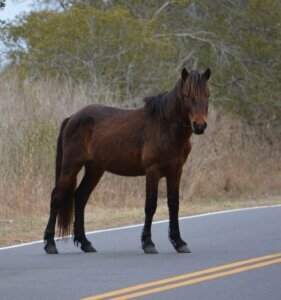This Maryland stallion is getting the boot — or is it the shoe?
The National Park Service said Monday that an “aggressive and highly food conditioned horse” named Delegate’s Pride — also known as “Chip,” which is clearly what this stallion had on his shoulder — was relocated from Assateague Island National Seashore. The harem stallion will be permanently relocated to the Cleveland Amory Black Beauty Ranch, in Murchison, Texas.

The NPS said Delegate’s Pride “had become increasingly aggressive towards park visitors and staff when pursuing human food or when park staff attempted to redirect him or his band away from crowded visitor use areas such as campgrounds and parking areas.”
Moreover, the anti-Mister Ed has been involved in more than half of all incidents that have resulted in injuries to visitors since 2017.
Delegate’s Pride also got stubborn: He stopped listening to noncontact methods used by park staff to move horses out of potentially dangerous situations — “totally ignoring actions which cause other horses to move.”
The “mane” issue, according to the park service, is that some individual horses and bands of horses are associating humans with food.
“Horses can easily become food conditioned when they receive food from visitors, both intentionally and unintentionally through improper food storage,” the NPS said in a release. “Unfortunately, reversing behavior once a wild animal has learned to associate people with food is extremely difficult.”
That means removal often becomes the only option, the agency said.
“We do not take these decisions lightly, but occasionally it is necessary for the safety of visitors and staff,” the NPS said.
There are new food regulations for Assateague Island campers: Campers can only store food in a vehicle or in a strapped cooler placed inside the food storage box provided by the NPS under all picnic tables. Assateague Island National Seashore replaced all picnic tables in the fall of 2019 with new tables specifically designed with horse-proof food storage compartments to hold standard-sized strapped coolers and hard-sided containers.
“All visitors need to take this food storage issue seriously and help us reduce the frequency of inappropriate interactions with the wild horses,” Seashore Superintendent Hugh Hawthorne said in a statement. “The free roaming nature of the Assateague horses is what makes them so unique and special, but there are also issues like this that need to be addressed.”








